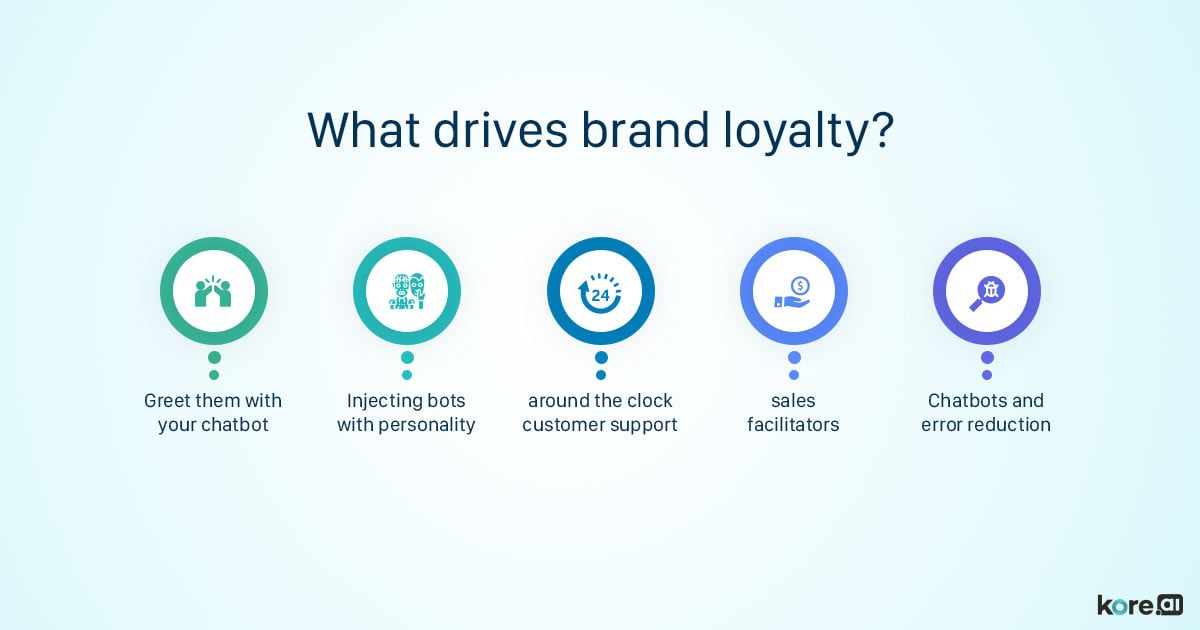Chatbots are gradually becoming an essential component of a successful business’s marketing mix. One of the crucial reasons for their continually growing popularity is their versatility when it comes to improving customer experience.
Similarly, there has never been a better time to consider investing your time and efforts into chatbots, given that there are now around two billion people using a variety of messengers in their daily lives. More importantly, these figures are projected to reach four billion daily users in under five years.
What we wanted to explore today is how businesses can integrate chatbots in their business operations, in order to increase brand loyalty, along with ensuring a more dedicated and engaged customer base. Let’s dive right in, shall we?
But first — why brand loyalty?
Brand loyalty is one of the most important factors that define a successful product or service. Given how inundated all the markets are with an immense number of options to choose from, loyalty is a strong differentiator.
More importantly, this is not just speculation. There is a vast body of research that indicates that businesses that invest engage their clientele and manage to establish a devoted following among their customers are much more likely to have a larger sales volume.
One study has found that little over 60 percent of clients are more inclined to make purchases at a much higher rate from the businesses they identify with.
The critical issue, however, is that we’re currently facing a decline in the amount of trust our customers have for us. Organizations will often go at great lengths to satisfy the needs of their stakeholders, employees, the markets they operate in. Yet what they’re often missing is arguably one of the vital components of an organization’s longevity, and it’s the amount of trust their clientele has for them.
Also Read: How EVAs Can Transform Modern Enterprises into Productive Juggernauts |
Here are some quick insights into what research suggests:
- More than half of the surveyed customers have less trust for brands than in the years before.
- Over 60 percent of consumers don’t trust the information they receive from an organization’s communications or PR department.
- Nearly 70 percent don’t trust the advertisement they see from businesses.
- A third of North-American consumers have stopped using services due to poor service quality.
So in the light of this trust crisis, we’re facing, can we hope that chatbots can address these issues and restore the consumers’ faith in small, medium, and large business?
What drives brand loyalty?
A recent study published by Morning Consult indicates that consumers are commonly loyal to brands fall under a set of descriptors. Here are some of them:
- Is reliable
- Interacts positively with customers
- Has high moral and ethical standards
- Is responsive
- Is innovative
The way we see it, chatbots can positively contribute to all of the above descriptions.

1. Greet them with your chatbot
By programming a chatbot that will greet your potential customers as their visit your website, you’re setting up a valuable tool that will let you personalize the customer’s experience.
For instance, users are invited to leave their names and contact information that will allow them to receive custom-tailored content, offers, and other materials that your organization publishes. Similarly, chatbots are an essential tool for first-party data collection, which will then allow you to then calibrate their experiences even more by targeting them, based on their interests. All this data can be beneficial when it comes to generating content with AI, based on your clients’ preferences. We’ve covered this in a previous post: Is AI-written Content a Future of Digital Marketing?
Personalized experiences are paramount to brand loyalty, and it is our responsibility to ethically source first-party data and use it to improve our customers’ interaction with our websites and our overall online presence, in order to gain their trust.
Also Read: UI Innovation: Tracing its Journey From First Computers to Virtual Assistants |
2. Injecting bots with personality
There’s a fascinating component to the perception of a bot by our customers. While it is true that a bot is simply a piece of software designed to respond to customer queries, our customers’ perception of them is much broader than just that. A bot is always more than just a bot. That is especially true if they are cleverly injected with personality. Our bot’s character needs to align with our customers’ values.
When designing a bot persona, always take into account what your customers’ interests, fears, and preferences are. Approach this process, just like you would outline your actual customers’ marketing personas.
When you’ve established the essential personality traits of your bot, it’s time to think about the tone, voice, and the vocabulary it will use to communicate with your clientele. Think of what would “warm” your client’s hearts. A chatbot can have a colorful Southern vocabulary, occasionally using some surface-level slang to create a holistic and familiar experience for your target audience. Or, if your audience is a younger and urbanite crowd, consider tapping into more modern language and terminology.
There are now a couple of services on the web that can provide you with guidance on regional linguistic peculiarities and linguistics in general when it comes to calibrating your bot’s behavior. For instance, at BestEssay Education, you can always reach localization professionals that can consult you on better language and flow.
How does this contribute to brand loyalty? It has to do with the humanization of your brand.
In effect, interaction personalization will allow your chatbot to improve the overall brand experience for your customers, along with their perception of your organization. It will allow establishing a much more profound and more meaningful interaction between your customer base and every facet of your business.
3. Chatbots — around-the-clock customer support
High-quality customer support is an absolutely indispensable component of a successful business. As the above-mentioned Morning Consult study indicates, positive customer service experiences are a differentiator in the current business ecosystem, and poor customer experience are shown to be detrimental to a business’s ability to retain customers. Knowing that their issues will be addressed at any time and in the most cordial and efficient manner is a definitive factor for customer loyalty and retention.
Chatbots are an exemplary technology to offer extensive customer support, troubleshooting, and address FAQs.
Few businesses can afford to have 24/7 customer support. Chatbots can solve that issue and provide the users with preliminary assistance even in very complex cases until a human customer service official can address the issue.
4. Chatbots — sales facilitators
Many businesses can explore the idea of using chatbots as a preliminary step for sales. For instance, think about how convenient it would be to use a chatbot to place an order at your favorite restaurant 15 minutes before arriving, so you can enjoy your meal right away.
The process of ordering a meal implies a very long chain of events that we need to deal with. Let’s think about it this way — you need to make a call to make a reservation. Your call will most likely be in a queue until a representative can speak to you. You’ll have to arrive at the restaurant, make an order, wait for it, and only at that point, you’ll be able to enjoy the final step of this “itinerary." Chatbots alleviate all the friction from this process.
Also Read: How AI is Transforming Enterprise Software Applications |
5. Chatbots and error reduction
Bots are excellent at dealing with the most annoying and repetitive tasks, which often are at the core of human error. This will eliminate a considerable portion of customer discontent and will improve the customer's satisfaction with the brand. More importantly, they will perform these mundane tasks without any coffee breaks or illness leaves.
There are multiple examples where businesses have considerably improved the productivity of their human team by delegating the repetitive work to chatbots. One such example is Globe Telecom that has seen an over threefold growth in employee productivity after integrating their Facebook Messenger chatbot. More importantly, this bot allowed them to minimize the volume of inbound calls received by their customer support department.
It’s worth noting that this decision optimized the work of the customer support department, which has increased customer satisfaction by a fifth.
Something worth considering
While this is a less actionable recommendation, it’s vital to stress just how important authenticity and transparency is in the grand scheme of things and how chatbots need to embody these two principles.
Here’s what you need to take into account before tapping into chatbots:
– It is essential that you take the time to review all the underlying moral and ethical problems associated with chatbots and AI in general before incorporating this technology.
– It’s important to let your customers know that they are communicating with a bot when they are doing so.
– It’s worth considering the potential intellectual property issues associated with owning the data shared with a bot.
Over to you
Although businesses are trying their best to improve their services and devise sophisticated marketing strategies to lure new customers, it’s safe to say that customer loyalty is a pretty rare animal in the current “ecosystem."
While consumers want to trust brands, doing so is gradually becoming more complicated.
Incorporating chatbots into your business’s online presence is a very sound decision and is bound to improve a myriad of essential markers like customer and employee satisfaction, to customer retention and loyalty.
Good luck!.










